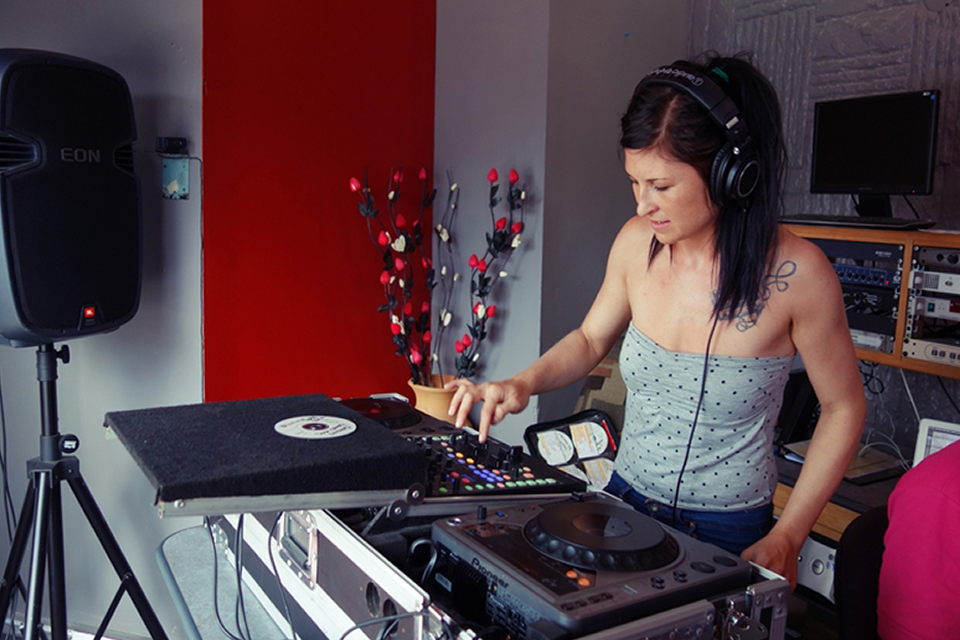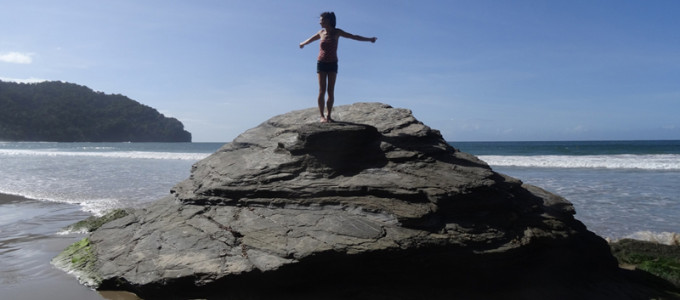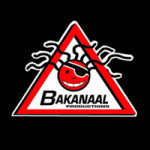DJ Mika Raguaa: Repping for Soca Worldwide
Interview for Carnevale Network – by Zoe Reeve (published 3.10.2015)
Zoe Reeve recently caught up with DJ Mika Raguaa, a multi-talented European female DJ who has shared her passion for Caribbean music with crowds from all over the world. Hear what she has to say about deejaying on a Notting Hill Carnival truck, experiencing Trinidad Carnival for the first time and more…
Zoe: Hi Mika, thanks for taking the time to chat today. Can you quickly introduce yourself to our readers?
Mika: My name’s Mika and I’ve been a DJ for Caribbean music since more than 7 years, which includes reggae, dancehall and Soca. I discovered all those three types of music at the same time. I play worldwide and my heart is beating for Caribbean music. I have a Bachelor’sdegree in media science and communication and I’m self-employed with my own projects.
Zoe: Ok cool. I heard that you recently went to Trinidad and deejayed there… It must have been amazing for you to experience the Carnival and everything in a place where Caribbean music is so important?
Mika: It was awesome. I wanted to go to Trinidad since the time when I first started listening to Soca, but I was studying for a long time so I didn’t have the money for it. This year I finally had the opportunity to buy a plane ticket to Trinidad, so that’s what I did!
I went there with nearly no contacts, and everything developed when I was out there. One thing lead to another, and I got the opportunity to DJ on 104.7 More FM which is a well-known Radio station based in the capital city, Port of Spain.
Trinidad is actually quite small – It’s only got around 1.3 million inhabitants (the same amount of people that live in Berlin) so a lot of people listen to that Radio station. In Trinidad there’s a lot of traffic so people sit in the car for a long time with Radio on, so I got the chance to reach some people. I had the chance to play some sets before and one after the Carnival season, and I was able to give the people some information about the European Soca scene.
I also played at Flash Fete at Pier One in Chaguaramas and on a boat party down the islands. It was awesome for me to be playing on a boat in the Caribbean Sea! I really feel like it changed my life – It was such a great experience, especially being a female DJ because in Trinidad there are almost no ladies doing that, so in the beginning it was really hard to be taken seriously, but now I feel like I’m in a position where I’m so strong that nothing can bring me down and I will be taken more seriously every time.
Zoe: It must have been like a dream come true for you! Aside from your great experiences deejaying in Trinidad, would you recommend their Carnival to people reading this? Was it as great as people say it is?
Mika: Definitely! It’s a huge event and you will see in the faces of the people how much everybody is loving the music and the Carnival culture. It is more than just a cultural experience. It’s like you’re on another planet – a crazy party that nobody wants to be done. One thing I would say is that it’s better to go there when you know somebody there, because (like in any country) there are bad things that can happen so you’re safer when you’re with the right people.
Zoe: So do you think you’ll go back next year?
Mika: Yeah, I will play on the truck on Carnival Monday and Carnival Tuesday for Legacy Mas Band. Since the moment I reached back to Germany I’ve been thinking about going back. I am missing my friends there, and they often message me saying that they miss me too. I really met some great people there. Some of them even visit me in Germany from time to time.
It also helped me to get a deeper understanding of Soca. I started to understand that people growing up in the Caribbean have different cultural conventions to do with behavior and receiving information as well. I went there to understand culture and the music industry. Before, I played the music and had an image of Trinidad Carnival in my head, but I hadn’t experienced a real J’ouvert [event to celebrate the opening of Carnival], and I hadn’t been toa real fete [Soca party]. Now I can present it in a different way ‘coz I have experienced it!
I was amazed by the fetes in Trinidad! In Germany, a Soca fete is just somebody renting a club and doing a party there. In Trinidad, it’s a HUGE event – with sometimes like 2 or 3 thousand people! I was amazed by how they celebrate Soca music. I made a mixtape when I got back of the Soca songs from that year, and I really feel like the songs sound best when you’re there at the fetes and on the road at Carnival. I wanted to give that feeling to other people when they listen to the mixtape.
Zoe: I’ll have to listen to it. Do you have plans for your next mixtape?
Mika: Yeah I’m hoping to release my next one in a few weeks. It’s actually in collaboration with Carnevale Network. It will be a mixtape presenting the European influences of Soca music.
When I was in Trinidad I noticed that Soca from Europe doesn’t reach there and they don’t really know too much about what is happening with Soca outside of the Caribbean. A lot of people were curious about what I showed them. I played some UK reggae and Soca and nobody knew it but they still said it was really good.
I want to give the European Soca artists the opportunity to present themselves on the Carnevale Network website as well as on the Mixtape, and at the same time show them that they’re important and give them more motivation to continue.
I hope that I’ll be able to influence the European Soca scene in a positive way, and then inform people in the Caribbean about it too. I’d also like to get the artists to connect with each other more because I think that can help them improve. Through all the research and networking I am doing, I am getting in touch with a lot of professionals in music industry and event management as well. Artists that are still in their own musical development shall be able to get in touch with them to continue and get on. I’d like to show a sign of unity. For sure I am also curious about how the Caribbean will react to the artists – some of them are singing in their foreign language.
There is another difference to show. Soca in Europe is played a bit different from what’s played in Trinidad. In Trinidad, the music is seasonal, so during one year, they’ll just play the songs from that season again and again, so you’ll hear mostly the same songs at all the different parties and on the road. In Europe, it doesn’t really matter about the season.
For sure I know the music politics of Trinidad. What I want is add something new to it and not to replace. But I am already working on a production coming up.
Zoe: That sounds like a great idea. Talking of mixing and mixtapes, I heard that you only DJ with CDs! That’s kind of rare nowadays. What’s the reason for it?
Mika: Well, I started with CDs seven years ago. In those days, people would say “are they really DJs?! They play with CDs?!” because CD players were kind of new. From when I started, I always had a connection to each and every CD because I burn them myself and make my own collections, but I never play from just one CD or anything like that.
For me, it’s not just a medium of storing music – it’s more than that. When I play, I interact with the crowd a lot and I also want to show them that I’m doing something with my hands – to show them that this is a real job. I wouldn’t like to be standing in the DJ booth at a club staring at a laptop screen.
Of course, it’s hard to carry all those CDs around, but I manage. I’ve carried it around loads of countries already – from Port of Spain to Paris from Switzerland to Sweden or even to Ibiza.
I’m always very proud to present my final CD collections. Every CD costs me money (to buy the blank ones) so I preselect properly when I burn them. When I play, I play in a spontaneous way – I look at the people and I look at the song, and I don’t start thinking about the second song until the first song is playing, and so on. My method might not be as quick as the DJs who play with a laptop, but the people hear the difference.
Zoe: Yeah that makes sense. Was it hard to learn to DJ at the beginning? How did you get into it?
Mika: I think you have it in your heart, really. I started when I was about 16 and I wanted to make mixtapes for boys I liked, or to have some nice music in the car later on. Cassettes were really important to me. I put a lot of effort into it because I always had a passion for music.
After I continued with CD-Compilations for friends (always made with love) until I found a computer program (CoolEdit) to arrange sounds digitally. From that time MP3-Files were starting to get big. This let me combine more than one MP3, cut them down and things like that, so I just did some experiments with it and made some mixtapes. For me, I see mixtapes as a form of artwork. Nowadays I record the Mixtapes live and edit them with similar programs. At the end of the day, deejaying is passion, an art form and a practice all at the same time.
Zoe: Cool… So you’ve come a long way since then and you’ve got a lot of experience within the European Soca scene. Would you say Caribbean music is getting bigger and more popular in Europe?
Mika: I would say it’s definitely grown a lot. A good example is the Berlin Carnival in Germany. It has developed a lot within the last 6 or 7 years – There are enormous crowds of people coming to celebrate now. During those days Berlin is packed with Soca fans.
By the way, for anyone who hasn’t been to Berlin Carnival, I just want to explain that it’s very different from Notting Hill Carnival. The Notting Hill Carnival is made by Caribbean people so it’s centered around Caribbean music, but Berlin Carnival is made to present the cultures that are present in and around Berlin, and there are even trucks for organizations, for example to promote vegan food!
At first, at Berlin Carnival, there was only one Caribbean truck, but in my opinion it’s a very big deal that there are now two Caribbean trucks there. It shows that Soca is becoming more popular.
Of course, two bands is nothing compared to Notting Hill. This year was my first time there and I was truly amazed by it and I had the chance to play on the truck of Arawak Carnivals mas band which made it to the best birthday I ever had.
Personally I would wish for myself that some more unity and knowledge about the European Soca scene would come up – so I try to do my best to represent it properly and worldwide. I feel I am on a mission.
Zoe: Awesome! Are there any last words of advice you’d give for anyone looking to become a DJ?
Mika: Don’t follow the hype – Stick to the songs that come from your heart. The songs that are hyped aren’t always the best songs for the moment.
MIKA RAGUAA / DJ MIKA – on a journey to Trinidad
DJ MIKA / MIKA RAGUAA – ON A JOURNEY TO TRINIDAD
… made with love for the caribbean music, culture and lifestyle
Special thanks to:
Akeem, Dave, Terrance, Timothy, D’Young Boss, Jevvon, Didi, Melanie, Glen, Zola, Darren,
Junior, Mayers Jay and Selector G Assassinz and all people i met backstage, on fetes or as a vagabond on d’road!
Sharon & Robert Amar, Mr Voice, DJ Miquel, Chest & Sen Sammy from 104.7 More FM
Kimoy Leon Sing (Trinidad & Tobago Express Newspaper) & Kieran Can (Trinidad Newsday)
Family Julien & Johnson: Sunshine, Pinkey, Dianne, Tony & the sweetest Kids Kenya and Kaleb
A very Special Thanks to Curt Johnson…
Music (SOCA) by:
Fayeann Lyons – break the world (2015)
Ravi B / Machel Montano – fettin like a boss (2015)
Machel Montano & Angela Hunte – party done (2015)
Ricardo Drue – vagabond (live + mix) (2015)
Mr Legs & Yung Image – no worries (2013)
Rajiv Samaroo – ola (Olatunji acoustic cover) (2015)
Machel Montano & Destra Garcia – come back (2015)
Machel Montano & Kerwin Dubois – possessed (2013)
Film (visiual & musicially) made by Mika
#MIKASHELLDOWN
DJ MIKA RAGUAA
Come on a musical journey with DJ MIKA. Since 2008 this lady is fascinating crowds internationally with her strong stage presence, her smile and her tight skills in mixing.
She plays the latest hits and biggest classics in Reggae, Dancehall, Soca, Calypso, Afrobeat, Latin Music, Global Bass and Tropical Disco.
On top, DJ MIKA loves to surprise you with exclusive remixes, long-forgotten music treasures, acoustic and cover versions.MIXTAPES & LIVE SETS
SUPPORTED BY
WEBSITE BY











